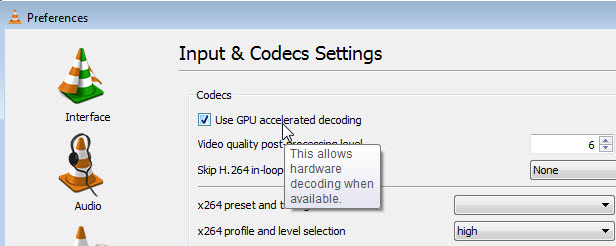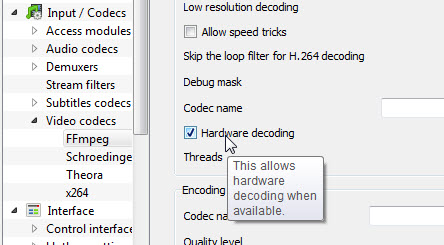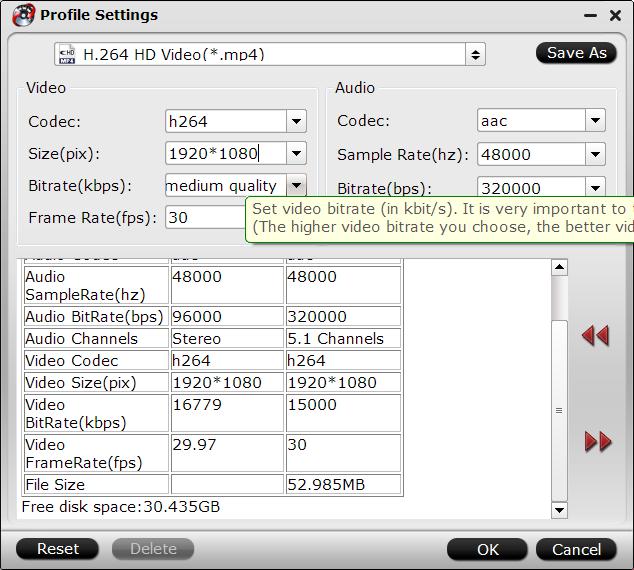As the free and open source cross-platform multimedia player and framework that plays most multimedia files as well as DVDs, Audio CDs, VCDs, and various streaming protocols, VLC also adds support for 4K video playback since an update in 2013. However, the 4K video playback effect on VLC is not that satisfactory.
"I'm trying to run a 4k h264 MPEG4-AVC part 10, 4k 3840x2160 video. It's totally choppy on VLC (2.1.6 Rincewind) which seems to use only one CPU. The video is perfectly smooth on mplayer which seems to use more than one CPU. My laptop is not super recent but it's still a powerful 2.5GHz i7 Samsung device. Is there a fix?"
"I bought a lenovo laptop, and tried to watch YouTube downloaded 4K video on VLC, it was choppy. I updated my graphics card, still choppy. Any advice, I'm confused, please help."

Fix VLC 4K Video playback choppy or lagging issue
Enable GPU accelerate decoding in VLC
The 4K video playback with VLC has strict requirements on the computer's processor and graphics chip. Sometimes, even if your computer meets the requirements, you may find that 4K video plays back choppy. This is due to the immense processing power required to play 4K. You can fix this issue by enabling the GPU accelerated decoding feature in VLC, this feature in theory uses the processing power of the graphic card to lighten the load on the processor of the system.
However, according to VLC's GPU decoding page, this feature is only available for H.264 streams. In addition, as the data is decoded in the GPU at the decoding stage and then transferred back to the player so that the other stages, filtering and streaming for instance, can be processed, this process can under under circumstances be slower than without gpu acceleration enabled. What's more, the VLC GPU decoding is only available for select operating systems. While Windows Vista and newer versions of the Microsoft operating system are supported, Windows XP is not at this point in time. The majority of graphic cards should support hardware acceleration just fine. Make sure you have installed the latest drivers though.
How to enable hardware acceleration in VLC?
Open VLC Media Player and click on Tools > Preferences or press Ctrl-P to open the settings window of the program. If you are using the simple settings interface, click on Input & Codecs on the left sidebar and check the Use GPU accelerated decoding box there.

If you are using the "all" interface select Input/Codecs > Video Codecs > FFmpeg > Hardware decoding instead to enable acceleration this way.

Click on the save button afterwards and restart the media player to work with the new setting. Try playing several video files to see if hardware acceleration makes a difference in terms of playback. If it does, keep the setting enabled. If it does not, just go back to the settings to uncheck the option again.
Compress and Convert 4K Video with VLC
If you are looking for a workable and simple workaround to fix VLC 4K video lagging issue, it is idea for you to convert and compress 4K video to VLC best compatible file formats in 1080p solution. Here, we highly recommend you our powerful 4K video converter software - Pavtube Video Converter for Windows/Mac, which works on both Windows 10/8.1/8/7/Vista/XP and also macOS Sierra/Mac OS X El Capitan/Yosemite/Mavericks. the program can comprehesively convert and compress various different 4K videos including 4K H.265, 4K H.264, 4K MP4, 4K MOV, 4K AVI, 4K WMV, 4K MKV, 4k MXF, 4K XAVC, 4K XAVC S, 4K Prores, etc to VLC media player best compatible H.264 HD MP4 file formats for smooth playback. Apart from compressing 4K to 1080p, the program also helps to compress 1080p to 720p for smooth playback video with VLC on smartphones or tablets.
To get the best video and audio playback settings for VLC, you can flexibly adjust the output video codec, bit rate, frame rate, resolution and audio codec, bit rate, sample rate and channels to make them fit with VLC best playback settings.
How to Convert and Compress 4K Video for VLC Smooth Playback?
Step 1: Load 4K source files.
Start the program on your computer, click "File" > "Load Video/Audio" or "Load from folder" button to import 4K video files into the program.

Step 2: Choose VLC best supported playback formats.
As a powerful media player, VLC can hold many video formats. After checking VLC supported video formats, and "H.264 HD Video(*.mp4)" under "HD Video" main category would be a good choice. You can also choose other VLC supported file formats according to your own needs.

Step 3: Compress 4K video to 1080p.
Click "Settings" on the main interface to open "Profile Settings" window, click "Size(pix)" to select 1920*1080 as the final resolution for output video. You can also tweak other settings to make them more fit with VLC.

Step 4: Start 4K video to VLC conversion and compression process.
After all the settings is completed, hit right-bottom "Convert" button to start to convert and compress 4K video to VLC best compatible 1080p H.264 formats.
Now, try playing the downscaled 4K video in VLC. It should be smooth when playback.
Useful Tips
- How to Flip or Rotate Videos using Handbrake?
- Play Tivo Recordings with Windows Media Player
- How to Use VLC to Convert AVI to MP4 on PC/Mac?
- MOV Compressor: How to Compress MOV to a Smaller Size on Windows/Mac?
- Stream 4K Video to Chromecast Ultra via Plex
- Get Chromebook Pro/Plus to Play MKV Files without Any Problem


 Home
Home

 Free Trial Video Converter
Free Trial Video Converter





